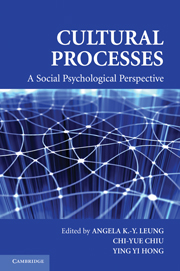Book contents
- Frontmatter
- Contents
- Figures and Tables
- Contributors
- Preface
- Part One Introduction
- Part Two Representational theories of culture
- 2 Culture as Lay Personal Beliefs
- 3 Culture as Intersubjective Representations of Values
- 4 Culture as Norm Representations: The Case of Collective Responsibility Attribution
- Part Three Psychological functions of culture
- Part Four Manifestations of cultural processes
- Part Five Transcultural processes
- Index
- References
3 - Culture as Intersubjective Representations of Values
Published online by Cambridge University Press: 05 June 2012
- Frontmatter
- Contents
- Figures and Tables
- Contributors
- Preface
- Part One Introduction
- Part Two Representational theories of culture
- 2 Culture as Lay Personal Beliefs
- 3 Culture as Intersubjective Representations of Values
- 4 Culture as Norm Representations: The Case of Collective Responsibility Attribution
- Part Three Psychological functions of culture
- Part Four Manifestations of cultural processes
- Part Five Transcultural processes
- Index
- References
Summary
To many Americans, the Charters of Freedom of the United States symbolize the striving of a young nation to create a society where human rights, freedom, and independence prevail. To his compatriots, Nelson Mandela's long-time involvement in South Africa's antiapartheid struggle and his eventual leadership in postapartheid South Africa made him a symbol of peace, equality, and freedom. Cultures are often built on a set of values, and these values are often symbolized by important artifacts such as the Charters of Freedom, social figures such as Nelson Mandela, historical events, and traditions of the cultures. The values of a culture and their symbolic embodiments, however, could be representative of the culture only if members of the culture recognize them to be so. Nelson Mandela would not symbolize the ideals of peace, equality, and freedom in South Africa if most South Africans did not recognize him to be symbolic. Human rights, freedom, and independence as embodied by the Charters of Freedom are important in American culture because most Americans know of their historical and cultural significance. To a large extent, the cultural importance of values comes from cultural members’ consensual representations of the importance of the values. To understand the values of a culture, it is necessary to understand the consensual representations that members of the culture hold concerning those values.
This chapter is about cultural members’ shared knowledge of their culture's value priorities. Values are conceptions of what is desired, preferable, and important in a person's life. They serve as guiding principles for people's behaviors and judgments in various situations and for their evaluation of life experiences (Feather, 1996; Kluckhohn, 1951; Rokeach, 1973; Schwartz & Bilsky, 1987). A culture's values constitute an important part of the culture. They guide the desired and appropriate behaviors of members of the culture.
- Type
- Chapter
- Information
- Cultural ProcessesA Social Psychological Perspective, pp. 40 - 64Publisher: Cambridge University PressPrint publication year: 2010
References
- 1
- Cited by

